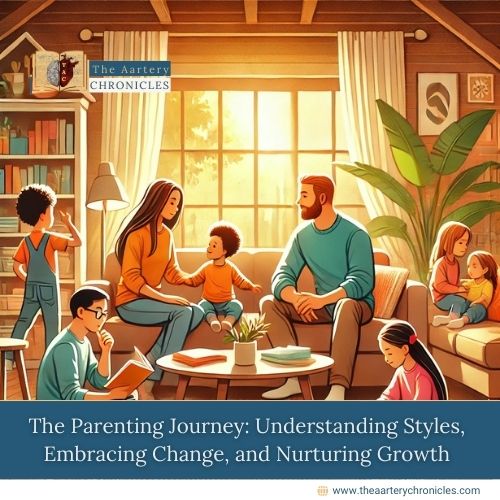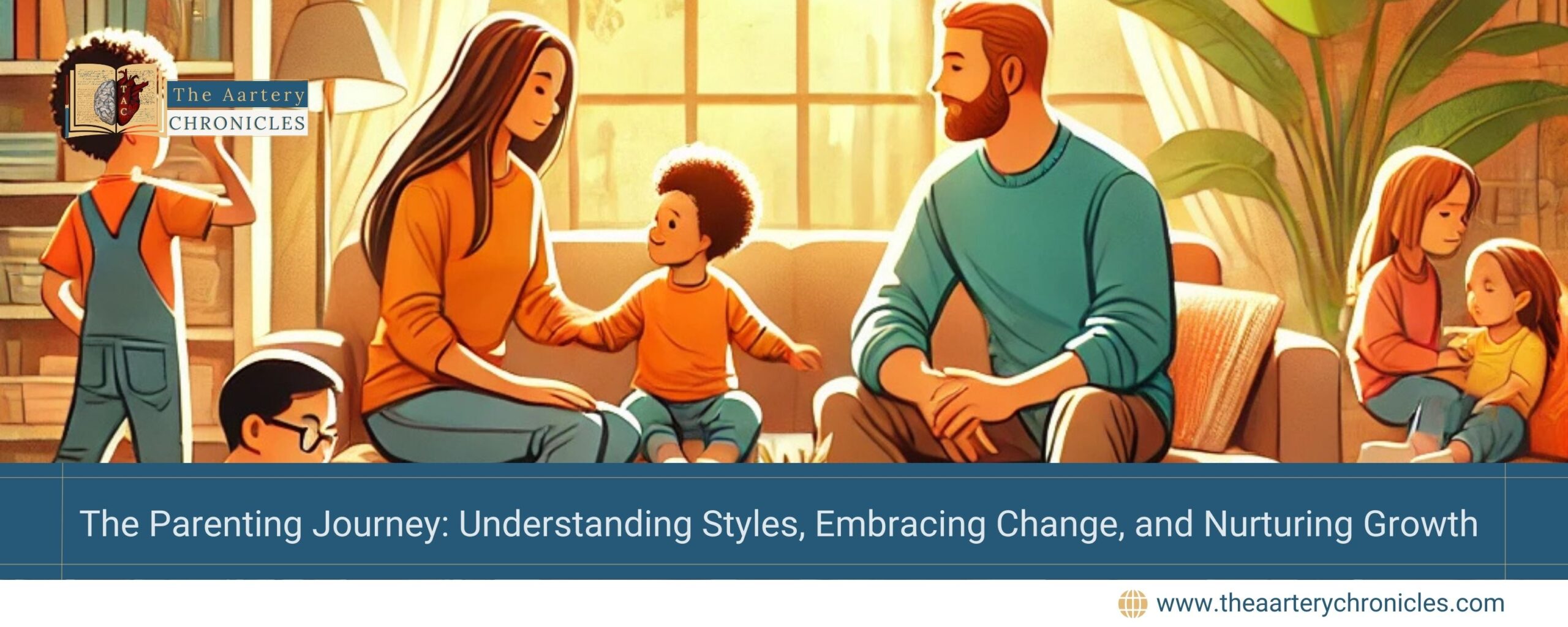

The Parenting Journey: Understanding Styles, Embracing Change, and Nurturing Growth
Introduction
Parenting is a journey filled with challenges and decisions, and one of the most significant choices parents face is determining how to raise their children. Whether parenting alone or with a partner, the ultimate goal is to nurture and guide children toward becoming
- Confident
- Responsible
- Well-rounded individuals
Over the years, researchers have identified distinct parenting styles that highlight parents’ diverse approaches.
Psychologist Diana Baumrind’s pioneering work in the 1960s identified three key parenting styles:
- Authoritarian
- Authoritative
- Permissive
Later, in the 1980s, researchers Eleanor Maccoby and John Martin introduced a fourth style, neglectful parenting. Each style offers unique dynamics and has lasting effects on a child’s development, influencing their
- Self-esteem
- Relationships
- Emotional well-being
This article explores the psychology behind these four parenting styles, delving into their characteristics, potential consequences, and how they shape a child’s journey into adulthood. By understanding these approaches, parents can reflect on their strategies and consider ways to create an environment that fosters emotional security, resilience, and personal growth.
Types of Parenting Styles and Their Effects on Children
Parenting plays a crucial role in shaping a child’s behaviour, values, and future. Researchers generally classify parenting into four main styles: Authoritarian, Authoritative, Permissive, and Uninvolved. Each style has its own approach to discipline, communication, and nurturing, which influences how children grow and develop.
1. Authoritarian Parenting
Characteristics:
- Strict rules and high expectations.
- There is little explanation for regulations.
- Mistakes are often punished harshly.
Effects on Children:
- Children may be obedient and goal-oriented.
- They can struggle with low self-esteem, social skills, and decision-making.
- High levels of aggression or rebellion may develop over time.
2. Authoritative Parenting
Characteristics:
- Clear rules and guidelines are explained with reasoning.
- Warm, nurturing relationship with open communication.
- Discipline is used as a learning tool, not punishment.
Effects on Children:
- These children are confident, responsible, and emotionally healthy.
- They often excel academically and socially.
- They develop strong self-regulation and problem-solving skills.
3. Permissive Parenting
Characteristics:
- There are few rules or expectations.
- Parents are warm and nurturing but act more like friends than authority figures.
- Discipline is rare or inconsistent.
Effects on Children:
- Children may have good self-esteem and social skills.
- They can become impulsive, self-centered, and struggle with self-control.
- They may develop unhealthy habits, such as poor eating or excessive screen time.
4. Uninvolved Parenting
Characteristics:
- Minimal involvement in the child’s life.
- Basic needs are met, but emotional support and guidance are lacking.
- There are few or no rules or expectations.
Effects on Children:
- These children may become self-reliant out of necessity.
- They often face emotional challenges, such as difficulty regulating feelings.
- Poor academic performance and struggles with social relationships are common.
Why Parenting Styles Matter?
Parenting styles directly influence how children handle
- Emotions
- Relationships
- Challenges
While no parent is perfect, understanding these styles can help create a healthy environment for children to grow into confident and well-adjusted adults. Balancing structure, warmth, and communication often leads to the best outcomes for children.
Authoritative Parenting: A Balanced Approach
Authoritative parenting strikes a perfect balance between setting boundaries and showing warmth. This approach involves clear rules and expectations combined with understanding and responsiveness to a child’s emotions and needs. Here’s why it’s effective:
- Clear Communication: Authoritative parents explain rules and listen to their children’s concerns, building trust and respect.
- Warmth and Support: These parents show love and care, creating a safe environment for children to express themselves.
- Firm but Fair Discipline: Rules are enforced consistently, but with fairness, helping children understand consequences without fear.
- High Expectations with Guidance: Children are encouraged to aim high, but parents provide support to help them succeed.
Impact of Negative parenting on children
1. Physical Health Decline
Children who experience harsh parenting may report worse physical health as they grow. This can include increased feelings of illness or discomfort. Over time, stress from negative parenting can lead to health issues, including obesity, as children might use unhealthy coping mechanisms like overeating
2 .Emotional Challenges
Harsh parenting can hinder a child’s ability to manage emotions. They might struggle with
- Anxiety
- Depression
- Low self-esteem
A child’s emotional needs often go unmet in a stressful or harsh environment, which can lead to difficulty in forming healthy relationships.
3. Behavioural Issues
Kids raised in negative environments may exhibit behavioural problems, like
- Aggression
- Defiance
They might find it hard to conform to social norms and may turn to risky behaviours as a way to cope with their feelings.
4. Impact on Relationships
Negative parenting decreases the warmth and closeness in parent-child relationships. This lack of connection can affect the child’s ability to form healthy relationships with peers and adults as they grow older.
5. Stress Response
Children raised in harsh environments may develop a heightened stress response. This means they could be more reactive to stress and less able to cope with challenges, leading to long-term psychological issues.
6. Intergenerational Effects
The impact of negative parenting can extend beyond one generation. Children who experience or witness harsh parenting may be more likely to replicate these behaviours in their own parenting, perpetuating a cycle of negativity.
7. Protective Factors
Interestingly, warmth and support from one parent can help mitigate the harmful effects of harsh behaviour from the other parent. This suggests that having at least one positive, loving relationship can offer a protective buffer against the risks associated with negative parenting
Parenting in the Digital Era
Parenting in the digital era presents a unique set of challenges and opportunities, as technology increasingly shapes how children learn, socialize, and grow. While digital tools can enhance problem-solving and personalized learning, excessive screen time and exposure to inappropriate content may negatively impact physical activity and social development.
Social media fosters creativity and connections but also poses risks like cyberbullying and unrealistic standards, making open communication vital. Parents can leverage digital tools such as
- Educational apps to support learning
- Safety software to protect children online
- Family management tools to streamline daily life
Financial tools, like paystub generators, can help parents manage expenses and plan for the future efficiently. However, achieving a healthy balance is crucial.
Setting boundaries, encouraging offline activities, and modelling responsible technology use are essential steps. By embracing the benefits of digital tools while addressing their risks, parents can create a nurturing environment that allows children to thrive in the modern world.
Nature vs. Nurture in Parenting: How Both Shape Early Childhood Development
Parenting is a profound journey where nature and nurture come together to influence a child’s growth and behaviour. These two elements—genetic inheritance (nature) and environmental factors (nurture)—are equally important in shaping who a child becomes. While nature provides the raw potential, nurture molds and guides this potential into reality. Understanding this interplay can help parents create an environment where their child thrive
What Is Nature?
Nature refers to the genetic blueprint a child inherits from their parents. This includes physical traits like eye colour and height, as well as certain temperaments and tendencies. For example, a child with a natural talent for music may show an early interest in melodies and rhythms. These inborn traits lay the foundation for many aspects of development.
However, genetics doesn’t act alone. Even though a child might inherit intelligence or creativity, how these qualities manifest depends on the environment they grow up in.
What Is Nurture?
Nurture represents the external influences a child encounters, family, school, friends, and society. Parenting style, the emotional support provided, and the quality of education are significant nurturing factors. For example:
- A naturally shy child may become more confident with loving encouragement and opportunities to interact socially.
- A child with a genetic inclination toward physical activity might excel with access to sports and supportive coaching.
Nurture emphasizes the importance of experiences. Positive environments foster healthy emotional and cognitive development, while adverse experiences can hinder growth.
Nature vs. Nurture: The Key Differences for Parents
- Flexibility vs. Fixity: Genetics provide a fixed framework, but nurture offers flexibility. For instance, while a child may inherit athletic potential, they will need opportunities like access to sports facilities and encouragement to realize it.
- Potential vs. Realization: Nature sets the potential, and nurture unlocks it. A child with a natural aptitude for academics need quality education and support to maximize their abilities.
- Interaction Over Isolation: Nature and nurture aren’t opposing forces; they interact continuously. A child’s genetic traits can shape how they respond to their environment, while environmental factors can influence how genes express themselves. For example, a nurturing home can help a child with a genetic predisposition to anxiety build resilience and coping skills.
Why This Matters for Parents
Recognizing the balance between nature and nurture allows parents to focus on what they can control, their child’s environment. While they cannot change genetics, they can provide:
- Love and Support: Build emotional security through unconditional love and encouragement.
- Opportunities to Explore: Allow children to try new activities that align with their interests and talents.
- Resilience in Adversity: Create a safe space where children feel supported during challenges.
Adaptive Parenting: The Key to Thriving in Changing Times
Parenting is a journey filled with unexpected challenges and moments of growth. One of the most essential traits a parent can develop is adaptability—the ability to adjust to changing circumstances with flexibility and resilience. No matter how well we plan, life often throws surprises our way, and being adaptable allows us to handle these moments with grace.
It starts with a mindset shift: instead of focusing on immediate problems, adaptable parents take a step back, pause, and view the bigger picture. This helps them respond thoughtfully rather than react emotionally. Flexibility in parenting also means recognizing that misbehaviour in children is often a result of their struggles or emotions, not a personal affront. By asking questions and seeking to understand, parents can address the root causes rather than just the symptoms.
Finally, an adaptable parent embraces a growth mindset, seeing each challenge as an opportunity to learn, grow, and strengthen their bond with their children. Adjusting on the fly, staying patient, and leaning into imperfections ultimately help create a nurturing environment where both parents and children can thrive.
Conclusion
Parenting is a profound journey that combines love, support, and adaptability in shaping confident and resilient individuals. Understanding the impact of various parenting styles; especially the authoritative approach, which balances clear expectations with warmth,can help create an environment that fosters emotional intelligence and independence in children. As parents navigate the challenges of the digital age and the interplay of nature and nurture, embracing flexibility and open communication is crucial. Each day presents growth opportunities; therefore, by responding thoughtfully to your child’s evolving needs and nurturing their potential, you not only equip them to thrive but also strengthen your bond, ultimately crafting a legacy of love and resilience for the future.
- https://jessup.edu/blog/academic-success/the-psychology-behind-different-types-of-parenting-styles/
- https://www.ncbi.nlm.nih.gov/books/NBK568743/https://www.abfc.co/authoritative-parenting-a-guide-to-balanced-parenting-approach/
- https://pmc.ncbi.nlm.nih.gov/articles/PMC6134209/
- https://trainingexpress.org.uk/parenting-in-the-digital-age-challenges-and-opportunities/
- https://www.lighthouse-learning.com/nature-vs-nurture-child-development-exploring-key-differences.html
- https://www.focusonthefamily.com/parenting/adaptability-an-essential-parenting-trait/









